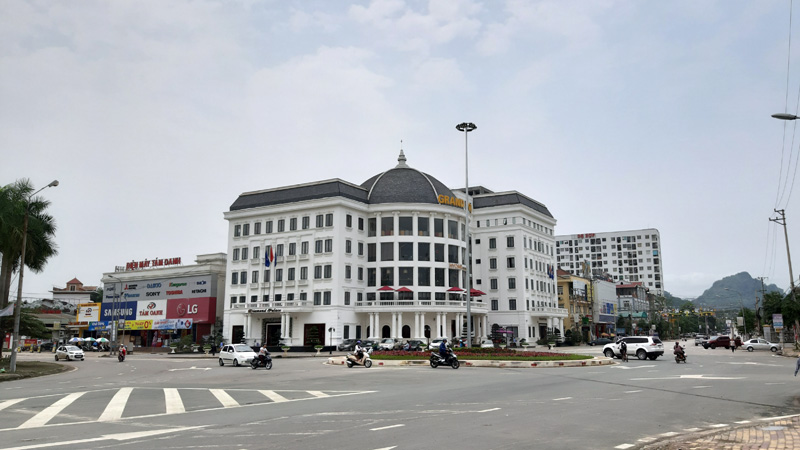
HBO - According to the Department of Construction of the northwestern province of Hoa Binh, the urbanisation rate of the province stood at 14.53 percent in 2015. The figure in the three subsequent years from 2016 to 2018 hit 16.95 percent, 18.96 percent and 21 percent, respectively. The growth of urbanisation rate of the province was higher than the country’s average.
However, Hoa Binh province’s urbanisation
rate currently accounts for only 54.69 percent of the national average, which
was 38.4 percent in 2018.
Director of the provincial department Ngo
Ngoc Duc said it is possible for the province to achieve the target of raising
the urbanisation rate to 25 percent in 2020 proposed in the Resolution of the
provincial Party Committee’s Congress.
The construction department has submitted a
plan to seek approval of the provincial People’s Committee on an urban
development programme and another to implement the programme, which set the
target of bringing the urbanisation rate to 25 percent in 2020.
Based on the programme and the province’s
urban development plan, the Hoa Binh People’s Committee assigned tasks for each
sector and locality to improve the rate of urbanisation. The Departments of
Home Affairs and Construction have worked with districts to review urban
development plans for respective urban areas to promptly supplement contents of
urban development, ensuring consistency in the implementation of a project to
re-arrange and re-organise administrative units in the province in 2020.
The plan aims to have 50,000 people live in
urban areas, raising the number of residents in urban areas to 201,668 out of
the 960,480 residents as regulated.
 Hoa Binh city mobilizes financial sources to invest in
infrastructure to realise the target of becoming a second-tiered urban area in
2020.
Hoa Binh city mobilizes financial sources to invest in
infrastructure to realise the target of becoming a second-tiered urban area in
2020.
Competent agencies have provided
consultation for the province to implement measures on urban development,
including those to improve planning quality and urban planning management;
those to mobilise finance in urban infrastructure and attract investment in
major urban development projects and programmes related to Hanoi capital city.
Agencies also focus on new urban
development projects which are in line with current infrastructure and public
works, as well as launch mechanisms and policies encouraging investment in
urban infrastructure and public-private partnership projects.
The province has prioritised in specific
tasks to bolster investment and development in three core urban areas of Hoa
Binh city, Luong Son and Mai Chau districts./.
The Standing Board of the Hoa Binh provincial Party Committee has agreed in principle on a proposal by the Standing Board of the Party Committee of Hoa Binh city to gather feedback on the city’s 1:2000 zoning plan, which forms part of its broader urban development strategy.
Hoa Binh province has made notable progress in public administration reform and digital government development, with the satisfaction index among citizens and businesses reaching over 84%, according to recent government evaluations.
Thanks to great efforts by local authorities in recent times, the governance and public administration performance of Mai Chau district has been significantly improved.
In the afternoon of June 6, the Party Committee, the People's Council, the People's Committee and the Fatherland Front of Lac Son district solemnly held a meeting to celebrate the 139th anniversary of the district's founding (1886–2025) and the 79th anniversary of the establishment of the district's Party Committee (1946–2025). There was the attendance of Mr. Bui Van Thang, the Vice Chairman of the Provincial People's Council; Mr. Quach Tat Liem, the Vice Chairman of the Provincial People's Committee; Ms. Dang Bich Ngoc, the Deputy Head of the National Assembly Delegation of the province; as well as the former leaders of the province and district through various periods, who are the natives of the district.
Implementing the Politburo’s Resolution No. 57-NQ/TW on breakthroughs in science – technology, innovation, and digital transformation is a golden opportunity for the northern mountainous province of Hoa Binh to renew growth model, improve competitive edge and shorten digital gap.
Resolution 57-NQ/TW, issued by the Politburo on December 22, 2024, identifies sci-tech, innovation, and digital transformation as strategic breakthroughs to build a developed and prosperous nation. In Hoa Binh province, this spirit is not just a slogan, it’s being put into action through concrete initiatives that form a "new development triangle”: digital citizenship, digital economy, and digital administration.



 Hoa Binh city mobilizes financial sources to invest in
infrastructure to realise the target of becoming a second-tiered urban area in
2020.
Hoa Binh city mobilizes financial sources to invest in
infrastructure to realise the target of becoming a second-tiered urban area in
2020.